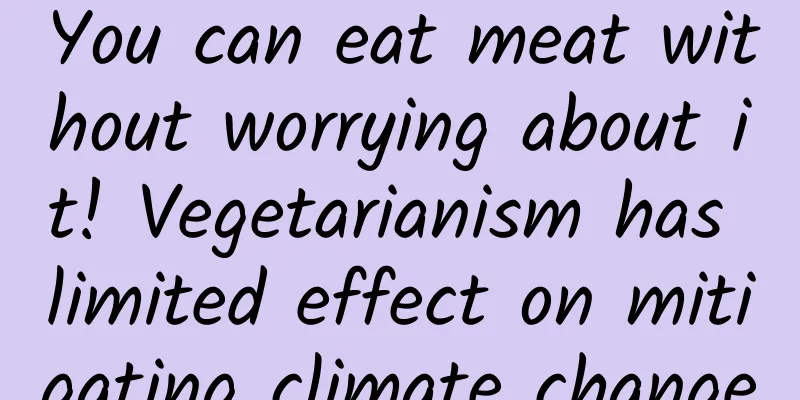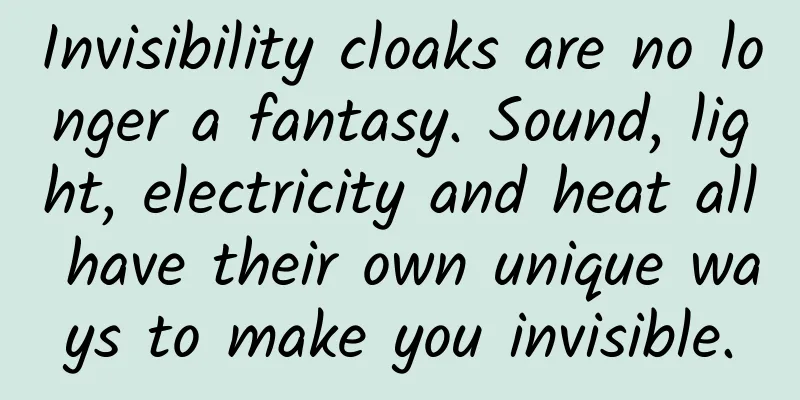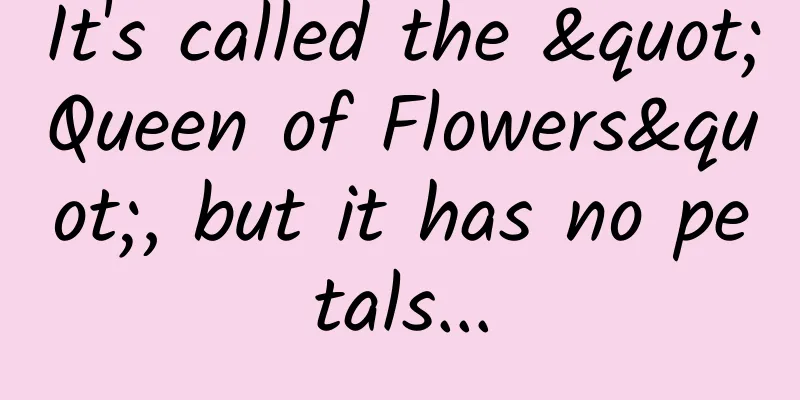You can eat meat without worrying about it! Vegetarianism has limited effect on mitigating climate change

|
"Every time the Chinese eat a piece of meat, a puff of smoke comes out of the Amazon rainforest." This sentence has made plant-based diets a thorn in the eyes of the Chinese people. The online condemnation of vegetarianism has been getting louder and louder, either because the West is dissatisfied with the Chinese people's eating well or because they think it is a conspiracy by plant-based meat factories. It is meaningless to speculate on motives. What we need to understand is: can plant-based diets, or vegetarianism, really bring the benefits they claim? Vegetarians choose this lifestyle for a variety of reasons, the main reasons being animal welfare and environmental friendliness. They believe that intensive factory animal farming causes a lot of suffering to animals. The main argument is: you wouldn't personally dissect a cute dog, so cows, sheep, dogs, and pigs shouldn't be treated the same way. I think there are big differences between companion animals and livestock animals, so I won't discuss this further. But factory animal farming does bring about the problem of antibiotic abuse, and animal welfare is indeed a part of our considerations for food production. As for environmental friendliness, the manifestation of vegetarianism is more tortuous. Direct impacts include environmental pollution caused by animal husbandry (such as glyphosate and fertilizer pollution of rivers and soil) and the impact of marine fishing on marine ecosystems. According to estimates by the Food and Agriculture Organization of the United Nations (FAO), greenhouse gas emissions from animal husbandry account for about 18% of global emissions, which is a huge carbon emission system. Fertilizers, pesticides and energy inputs, as well as gastrointestinal fermentation in the breeding process are all major. But the indirect impact of agriculture and animal husbandry is actually more significant. Data show that the production of meat and dairy products has occupied 30% of the earth's land area and 70% of agricultural land. Currently, 80% of legumes go into the mouths of animals and become a source of protein in feed. Therefore, if the production of meat products is reduced, methane emissions can theoretically be reduced and the current situation of forest destruction can be alleviated. But is the situation really that simple? Let's take a look back at the smoking Amazon rainforest and see what's really happening there. Is meat the culprit? According to Global Witness, stopping the conversion of rainforest to beef production could reduce Brazil’s agricultural carbon emissions by 69%[1]. The main reason behind this is that beef companies turn a blind eye to ranches where deforestation is occurring and continue to purchase “black” beef. But this does not have to be the case. Ranches are abandoned after a few years due to degradation, and ranchers cut down new forest land for pasture. In fact, they can also choose to restore degraded pastures and stop destroying rainforests. Researchers estimate that if the 12 million hectares of degraded pastures in the Amazon are restored, they could produce 17.7 million cattle each year and reduce the demand for new pasture land[2]. Moreover, indigenous peoples still use slash-and-burn farming to grow feed crops, which further exacerbates deforestation[3]. Therefore, if we want to prevent further degradation and deforestation, we must first get local people to adopt rotational, sustainable agriculture, rather than reducing their meat intake first. Amazon deforestation, cattle herds, and soybean production from 1996 to 2014. From 2004 to 2014, cattle herds and soybean production increased year by year, while deforestation also decreased. Between 2004 and 2012, as Brazilian authorities strengthened environmental regulation and rewarded Amazonian communities for finding ways to generate income without clearing the rainforest, the destruction of the Amazon rainforest dropped dramatically, while the livestock industry improved year by year[4]. This shows that deforestation and the development of the livestock industry are not in conflict. At this time, saying "eat less meat" is undoubtedly ignoring the main contradiction and focusing on the secondary contradiction. After talking about Brazil, let's look at the world. The impact of agriculture and animal husbandry must be analyzed from the beginning. There are two main types of emissions related to meat: methane and land changes caused by feed crop cultivation. In food-related climate change, land changes (i.e. deforestation and degradation, etc.) account for 38%, while methane emissions account for 35% [5]. (2021, FAO) Therefore, let's start with the recent hot topic of methane emission reduction. Under the current climate change, methane and other non-CO2 gases are topics of increasing concern. However, neither China nor the United States mentions methane emissions from animal husbandry in their methane reduction roadmaps. (Analysis of the COP26 "Global Methane Commitment": The superficial efforts of the United States in reducing methane emissions; Environmental and Economic Policy Research Center of the Ministry of Ecology and Environment_Suggestions on strengthening methane emission control in my country's "14th Five-Year Plan") The reason for this may be that, compared to methane emitted from fossil fuels[6], methane from animal husbandry is itself part of the carbon cycle. After the grass eaten by cattle is fermented in the rumen, it will be broken down into water and carbon dioxide in about 10-20 years, and then reabsorbed by the grass through photosynthesis, completing the carbon cycle. This process does not produce additional carbon emissions. Methane from the fuel industry, on the other hand, releases stored carbon, which is more urgently in need of resolution. However, the use of fertilizers and the cultivation of feed crops all produce carbon, and the transportation of feed, dairy cow farming, cow manure treatment, and even product transportation (although a small proportion) all produce carbon dioxide. This means that we cannot take it lightly and must reduce similar carbon emissions through nutritional regulation, the addition of feed additives that inhibit methane production, and improved pasture management. In my opinion, the previously popular "Dairy Republic" (that is, there are 300 million cows in the world, and their total carbon emissions are second only to China and the United States, at about 5 billion tons) makes some sense, but green innovation means that we can reduce emissions without reducing the scale of animal husbandry, while ensuring food security and taking into account economic development. This best of both worlds result is what meat lovers are more happy to see. As for the change in the use of land, vegetarians believe that if all the current arable land for feed crops is freed up, it will not only reduce deforestation, but also allow the remaining space to be used to cultivate forests. Take soybeans, the main source of feed for cattle, for example. Currently, the area of soybean cultivation exceeds 1.8 billion mu, ranking fourth in the world's crop planting area[7] (ranking first in the Americas). According to statistics, about 80% of soybean products end up in the stomachs of animals. Vegetarians say that this energy conversion efficiency is very low, and humans should be allowed to eat these proteins directly, eliminating the animal link[8]. In contrast, researchers in the meat industry also believe that 65% of the world's arable land is marginal (50% in China), which is only suitable for grazing or growing feed crops due to terrain and other reasons. Animals do not occupy our protein, but instead improve our overall energy conversion efficiency. Grazing cattle can improve the environment, but if they only rely on grazing, the number of cattle can only be maintained at 13% of the current level; if cattle are raised in a free-range manner, because they have other activities besides growing meat, the conversion efficiency is not high when ensuring animal welfare... This kind of debate is endless and needs to be discussed again. However, I think the problem is not whether animals occupy our precious arable land. The total amount of food is enough for people all over the world to have a nutritious diet[9], but food waste and uneven distribution have led to famine[10]. So it is not a problem of feed crops taking up too much land, but a problem of unreasonable distribution of existing food. Therefore, it is too idealistic to think that eliminating the animal industry and increasing arable land will be able to feed all of humanity. Even if we can accept that all the meat on the table is replaced by soy products, can the extra land make us carbon neutral? According to a joint report by the World Conservation Union (IUCN) and the United Nations Environment Program (UNEP), nature-based solutions can provide some carbon sequestration, but if we maintain the current fossil fuel emissions, even if the world is covered with forests, it will only give us a ten-year respite. Therefore, when it comes to mitigating climate change, reducing deforestation and increasing green innovation investment in the livestock industry are the most direct means. There is actually a long chain between not eating meat and reducing carbon emissions. If there are enough vegetarians to influence the market, it may have a certain boost to industrial transformation. However, both the increase in forests and the reduction in carbon emissions cannot be achieved simply by reducing meat consumption or changing the diet structure. Changing lifestyle is only the first step in saving the world. After reducing our personal carbon footprint, we must show the market and the government that we care about climate change. This is the only way to prevent decision-makers from trading the environment for profits and enable companies to achieve their sustainable development goals. [Special note]: The author of this article has not received any sponsorship from the beef industry or vegetarian organizations. The author of this article has tried his best to exclude biased information. If you have any questions, please contact the author. Text/Stan Review/YJ [1] https://www.imaflora.org/downloads/biblioteca/Relatorios_SEEG_2018-Agro_Final_v1.pdf [2] Mauricio Voivodic, Executive Director of WWF Brazil, 2021.11.22 [3] [4] https://www.inputbrasil.org/wp-content/uploads/2016/10/GTPS_BRAZILIAN-LIVESTOCK-OVERVIEW_v3.pdf [5] https://news.un.org/zh/story/2021/03/1079852 [6] https://news.cau.edu.cn/art/2021/9/28/art_8779_786698.html [7] http://www.zys.moa.gov.cn/mhsh/202105/t20210513_6367666.htm [8] https://news.sciencenet.cn/sbhtmlnews/2019/9/349883.shtm [9] https://www.fao.org/3/ca9692zh/CA9692ZH.pdf [10] https://news.un.org/zh/story/2021/10/1092852 #vegetarian #beef #climate change #agriculture #animal husbandry # |
Recommend
How to use data to capture your target users?
A question that operations personnel are usually ...
APP offline promotion and operation strategy!
Someone will definitely ask, APP is an online pro...
WeChat applet development video tutorial compilation [Baidu cloud resource collection]
On January 9, 2017, the mini program released by ...
What is the interest rate of the special national debt for fighting the epidemic? How to buy the 2020 special government bonds
On June 18, the special government bonds were iss...
A novel writer will show you how to make money by writing novels in 30 days. Simple and practical training
We will break down every key step of writing a no...
Dual-mode connection, 4-level DPI adjustment, Xiaomi convenient mouse 2 makes mobile office more convenient
Mobile office has become a modern trend of workin...
One set of models to solve the core selling point planning of the brand
The company's new brand is about to enter the...
International Children's Day丨May we always keep our childlike innocence and our original aspirations!
"childhood" It's in our life The be...
Why do roosters crow in the morning?
"The lights are on at midnight and the cocks...
How to build a 2B user operation system!
Taking Ouyeel Cloud Commerce’s B2B growth practic...
Expert summary: 8 practical tips to greatly improve UI design efficiency!
When designing, do you struggle with various poss...
13 creative ways to play events, a must-have for marketing in 2020!
The homogeneity of current market competition is ...
Jia Yang | How to make a beautiful Mars rover
"Outside Longlou Town, Zibei Dong is not a g...
How much do you know about data operations?
Generally speaking, data is the most authentic wa...





![Insurance Vision Academy: Teach you step by step how to create a video account for insurers [Video Course]](/upload/images/67cc378d84251.webp)



